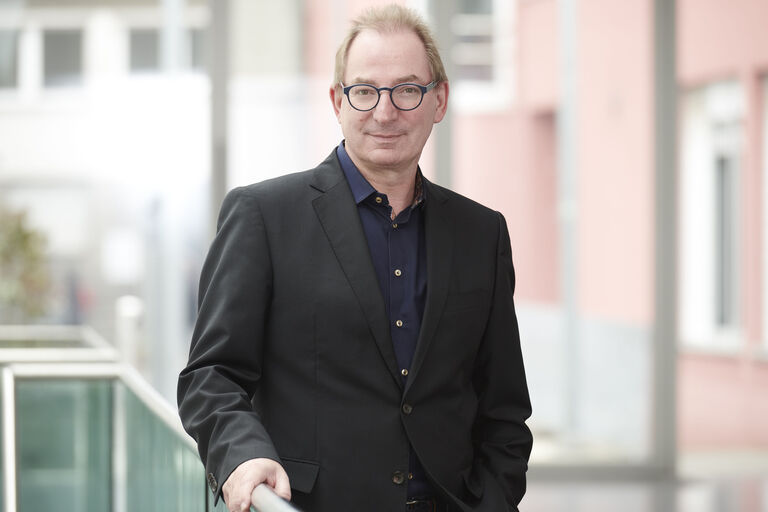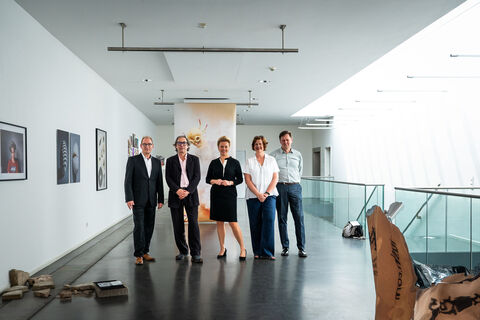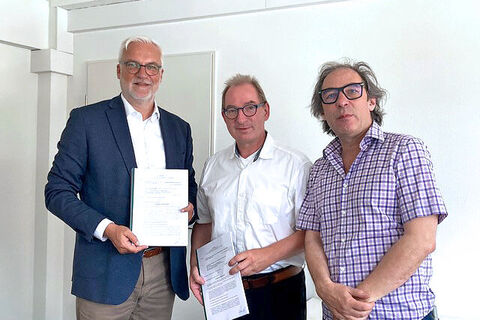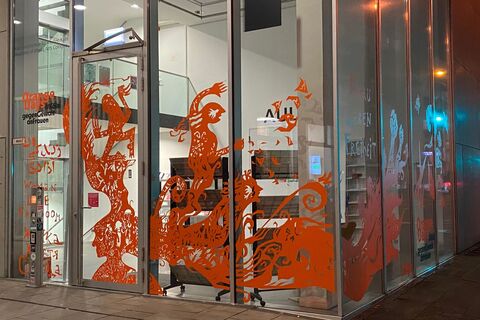- Exhibition
- Awards
- Library
- Speech
- edition KHM
- Festival / Award ceremony
- FG exMedia
- FG Film und TV
- FG Kunst
- FG Kunst- und Medienwissenschaften
- Movie screening
- Glasmoog Books
- Glasmoog - Raum für Kunst und Diskurs
- KHM Journal
- Concert
- Cooperation
- LAB Jahrbuch
- LECTURE Reihe
- Teachers elsewhere
- literature
- off topic
- News articles
- Publications
- Job offers
- Study
- TV broadcast
- Event
- all
Introduced – Dr. Oliver Herrmann

The Acting Chancellor and State Representative of the KHM in a interview.
Mr. Herrmann, you have been acting chancellor and state representative at the KHM since mid-March: What is a state representative and why does the KHM suddenly have one?
A State Representative is appointed by a ministry, in this case the responsible Ministry for Culture and Science of the State of North Rhine-Westphalia, without an election process or call for tenders. This always happens when an institution, in this case the KHM, has an urgent need to fill a management position very quickly. At the KHM, the chancellor position had been vacant for more than half a year. A new bidding process takes far too long to quickly solve these related problems, gaps and staff shortages.
What did you expect, what surprised you at KHM?
I have been in leadership positions at universities or colleges for over 15 years. But I have never been part of the university management of an art academy, which was and is very new and different for me. I experience intensively that a university of the arts is organized and structured very differently than a university or university of applied sciences. Another challenge I immediately encountered was that many positions in the administration were and are vacant because they were not advertised for a long time, e.g. personnel management, library management, IT, technical positions and many more.
Apart from this last point, what is your other mandate?
My mandate relates to all the rights and duties that a chancellor has. I name three core duties: Commissioner of Finance, i.e. the budget, Head of the entire administration and member of the Rectorate. This means that as chancellor I have to guide all strategic decisions, participate in them and also drive them forward. In the case of the KHM, this includes - because this was agreed in the university contract - developing and implementing a university development plan. This does not exist at the moment and we have to work on it. That is a major task for the university and thus for the rectorate.
And what is it like to work with the rectorate when, as a state representative, you have suddenly "fallen from heaven" for everyone involved?
I was welcomed in a very friendly and respectful manner, which is not necessarily to be expected. Firstly, because I took up this job overnight without much notice, and secondly, because I can very well understand that everyone is initially cautious and wait-and-see in such a situation. It is all the more gratifying that me and the rectorate team grow together to form a good team and want to achieve the best.
What can you learn from the students, or how can you learn from the students at KHM?
I try to get in touch with as many students as possible. Of course I have met with the representatives of the AStA and StuPa. I am aware that studying at the KHM is different than at a university or UAS. We only have one course of study and one diploma, which already alters many requirements and implementations. And it is a project study, a unique feature that create other forms of contact, communication and conditions.
In addition, there is a variety and diversity in daily life, in the language and in the artistic focus. Being close and cooperating are very much part of project study: via the direct supervision by teachers, via the relationship of students with each other - as they often help, support or even work on a project in different aspects and functions. We have an administration that is able to guide and support this aim in real time and in many details. That is not the case at other universities and UASs at all.
You have a doctorate in law, what did you do before the KHM?
My background is in university and science management. I started at the University of Bielefeld as a legal advisor and deputy head of personnel, then I was head of personnel in Paderborn, then chancellor at the University of Kiel. For family reasons, I returned to my home town of Detmold and was then president of the Ostwestfalen-Lippe University of Applied Sciences. For a good seven years now, I have repeatedly taken on a task comparable to the one I have here at the KHM. For example, I was acting chancellor at the Rhine-Waal
University of Applied Sciences or was appointed managing director at the Foundation for University Admission in Dortmund.
Did you always wanted to be a university lawyer?
Yes, and funnily enough, my last placement was at Detmold University of Music, during my training to become a Diplom-Verwaltungswirt, which left its mark on me! At that time I thought, perhaps still somewhat naively, that I would like to run a university like that one day. In recent years, as I mentioned, the focus has been more on advising management and universities, or on working as a state commissioner.
How do you see the future of German higher education institutions, especially art and music academies?
A lot has happened, for example, with regard to the appointment process for professors. In the past, it was clear that the responsible ministry appointed the professors, but today the universities and universities of applied sciences are autonomous in cooperation with the rector. They are independent entities, have a global budget, do not need a planning of staffing levels. They are also employed by the university and not by the state. have university employees and not state employees. This important step is missing from the colleges of art and music. Unfortunately, it is not discussed politically in the way that it should be discussed. often with the argument that these universities are too small, suffering from workload increase.
I see it differently: More autonomy should be the goal here, too - and I see it the same way in the rest of the education system, as well as in the school system. Here, too, autonomy should be clearly promoted, e.g. in decisions about which teacher the school hires, whether it to want to expand.
In January 2024, the KHM will move to a new main building, next to the Cologne Chamber of Crafts (HWK) at Heumarkt 14. As a state representative, you are also involved in this relocation process. What does that mean for you?
The move was certainly also a reason to appoint me as State Representative, because I bring such experience from Kiel, where my nickname was the "Building Chancellor". Anyway, the move keeps me busy every day, we have just signed the lease with the HWK. For the KHM, a great and new phase begins: a completely newly renovated building, a really representative building, a good location, a better visibility and a closer work relationship under one main roof! I think it's great!
The interview was conducted by Dr. Juliane Kuhn, June 14, 2023
- Exhibition
- Awards
- Library
- Speech
- edition KHM
- Festival / Award ceremony
- FG exMedia
- FG Film und TV
- FG Kunst
- FG Kunst- und Medienwissenschaften
- Movie screening
- Glasmoog Books
- Glasmoog - Raum für Kunst und Diskurs
- KHM Journal
- Concert
- Cooperation
- LAB Jahrbuch
- LECTURE Reihe
- Teachers elsewhere
- literature
- off topic
- News articles
- Publications
- Job offers
- Study
- TV broadcast
- Event
- all







